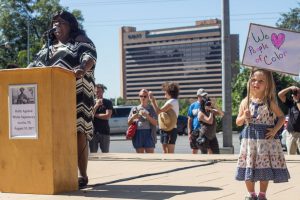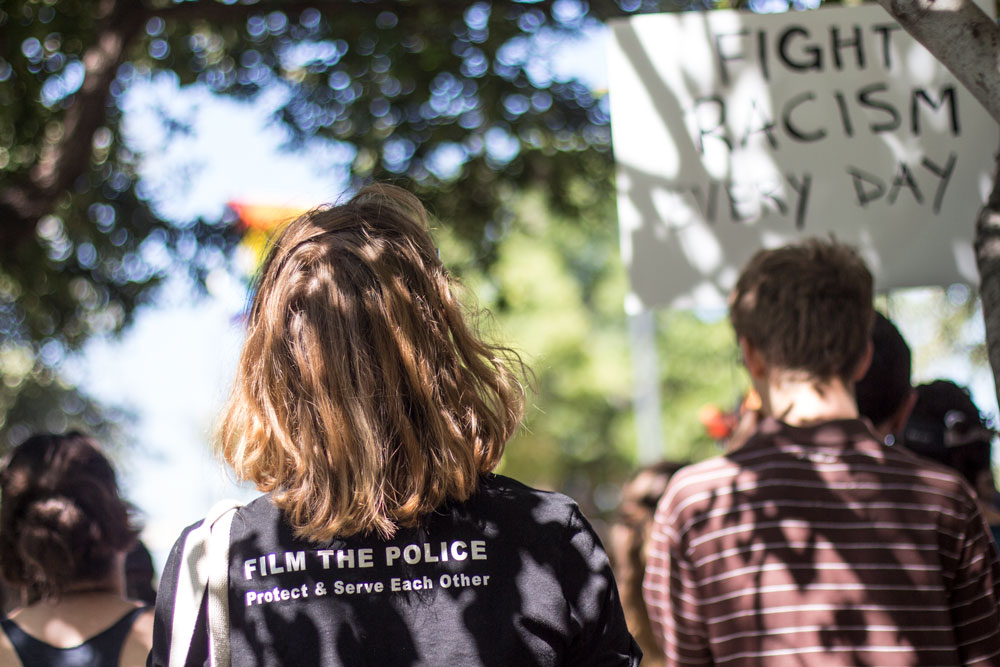[vc_row][vc_column][vc_column_text]
By Halie Davis

After the shooting in Charlottesville, philosophy professor Bryan Register decided it was time for Austin to step away from hosting vigils and break the silence. Having never organ
ized an event like this, he quickly gathered politicians and educators to speak at the Rally Against White Supremacy this past August. Register’s intention was to start the conversation about ending hate.
“The reason that people are supposed to work to overcome racism isn’t because they are personally responsible for it. We’re supposed to work for a better world.”
Living in the ‘Make America Great Again’ era, the nation is seeing a backlash from many groups. Feminists took to the Internet with #MeToo. The LGBTQIA community pushed against the Texas legislator passing the ‘bathroom bill’ (Senate Bill 6). Many ethnic and racial minorities flooded the streets during the Day Without Immigrants protest. Fists were raised during NFL games against racial injustice and police brutality.
In the current political climate it’s almost difficult to ignore the amount of controversy the Republican Party receives for backing candidates with bad behavior, like Roy Moore. To address these issues local voter turnouts are changing, calls are being made to government officials and protests are happening.
Patricia Hatcher, humanities associate professor, spoke at the Rally Against White Supremacy. “One of our speakers earlier said we are not born with hate. That’s true. Hate is a learned behavior. It’s time we unlearn it.”
 The theme of the protest was to speak out against hate of any sort. Speakers ranged from various areas in the Austin community from Reverent John MacIver Gage to Mayor Steve Adler.
The theme of the protest was to speak out against hate of any sort. Speakers ranged from various areas in the Austin community from Reverent John MacIver Gage to Mayor Steve Adler.
“Austin city council has its heart in the right place when it comes to issues about race,” Register says. “They are concerned about gentrification in East Austin. But whether their concern is translated into actual action is a separate question and we’ll be seeing what they do with CodeNEXT.”
CodeNEXT is a project designed to re-shape the city. This document contains over 1,000 pages, explaining a Land Development Code structured to make Austin a more livable city. The city council is set to publish the third draft of the code in February. So, as the cost of living in Austin continues to rise, so does the price of higher education.
“I think a lot of our processes are geared towards students that have come from privilege, who do have parents that went through the process or went to school,” says Black Student Association (BSA) advisor Latisha Marion. “Gentrification is happening, but it’s our responsibility to acknowledge that and try to adjust to fit those cultures or people trying to come [to ACC].”
In recent years, ACC has experienced a decline of enrollment from minority students. With organizations such as Black Student Success Committee, ACC is focused on recruiting and retaining students of color and/ lower income. Encouraging students to become members of these organizations is one of the strategies ACC is using to increase the number of students’ enrollment to completion. As members they are expected to act as peer mentors for other and incoming students.
“The feedback we’ve been getting from students is that they don’t feel comfortable,” Marion says. “Students that are in classes are saying, ‘hey when I came, I was uncomfortable as well. I didn’t know that I was going to be welcomed. Nobody looks like me or gave me attention I think I deserved.’”
Another way ACC works to combat these feelings is through their partnership with the National Endowment for the Arts (NEA) for the Big Read. Claudia Rankine’s Citizen: An American Lyric is the chosen book for Spring 2018. Citizen is a book-length poem about micro aggressions. This project is meant to spark conversation among students, faculty and the community about being a person of color in a country with a legacy of white supremacy. The main intention is to provide insights growing from these discussions.
“The key is to keep the dialogue going about tolerance and anti racism,” says Hatcher. “That is how we will command change.”
Many put up a guard when topics about racism and inequality enter a discussion. However, at the rally, congressman Lloyd Doggett did not shy away from speaking against President Donald Trump empowering racist and white supremacists. Doggett’s speech started with, “in Austin, we don’t all have to agree on everything as long as we respect our differences. We need everyone in this community to turn up the heat on hate.”
However, people of minority groups have a tendency to adapt in heated political climates. Racial and ethnic differences have been in America since it was founded. The differences that have grown are showing from the majority.
“I think I hear about it more from our counterparts that are more distraught and upset about it,” Marion says. “Even the students that aren’t black and in BSA, want to do this [to speak out]…they’re enthusiastic about making the change and making voices be heard.”
Contrary to those students benefiting from white supremacy, Register says there is a difference for feeling personal guilt and taking responsibility for overcoming the consequences of these crimes. “There are many white people who become defensive when there is a question about their benefitting from white supremacy. And the fact is, I am not responsible for white supremacy. I did not own slaves. Also, I benefit from that history. It’s because I have this benefit from that history that I have some responsibility for overcoming these problems – not because I created the problems.”
As students work to turn up the heat on hate, some mentors suggest becoming involved through campus organizations, like BSA.
“On a smaller scale, I think that’s exactly how we bring about awareness,” says Marion. “That’s how we change things, how we make people change their minds about social situations and I think it has a larger impact than any protest can ever have, when you’re getting the people one on one and you’re teaching them something.”
Conversations about understanding people of color, the transgender community and everywhere in between can be seen in the media, but how do we act on them individually? One on one or in protests, the first plan of action towards ending hate is gathering together and speaking out.
“I think the next step is to move [conversations] onto our college campuses and get the student body involved,” says Hatcher. “During the 60’s the college community were the biggest voices and we need to have that happen again.”
Pick this story up in the Spring 2018 Life4U magazine on campus[/vc_column_text][/vc_column][/vc_row][vc_row][vc_column][vc_video link=”https://youtu.be/_dHMfBNf0Bo”][/vc_column][/vc_row]


